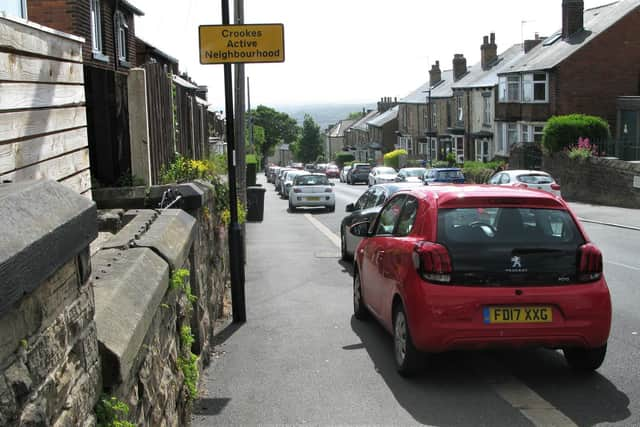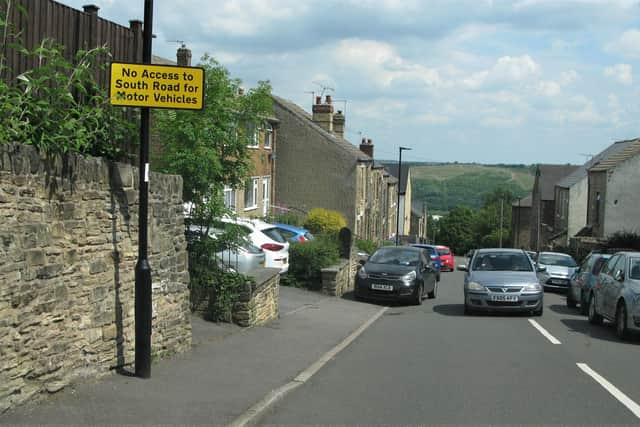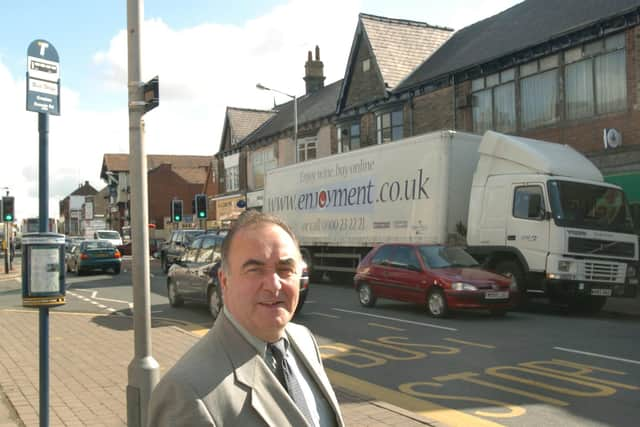OPINION: Controversial Sheffield ‘Active Neighbourhood’ schemes like Crookes and Nether Edge will harm economy
and live on Freeview channel 276
Many of my neighbours in Crookes and Walkley have recently found their streets blocked by mammoth planters, writes John Hesketh.
They block or restrict traffic. That’s the intention.


Despite valiant efforts by residents to slide these enormous plant pots aside, several streets have been blocked - Slinn Street, Sackville Road, Highton Street, Newent Lane, for instance.
Advertisement
Hide AdAdvertisement
Hide AdThis is just the beginning: further restrictions are planned on Springvale Road, Hands Road, Fir Street, Heavygate Road and Matlock Road.
One-way schemes are intended for Springvale Road and Greenhow Street and soon it’ll be cycle only on some main roads in the district – the signs are already in place. Restricting traffic flow on currently slowing-moving Crookes main road is next up, almost certainly throttling businesses and choking pedestrians.
With more of this scheduled for Nether Edge, Kelham, Darnall, Abbeydale Road and Ecclesall Road, it’s is hard to overstate the impact of the Council’s radical highways policy on Sheffield.


The new measures will restrict delivery vans, emergency vehicles, lorries, taxis, and cars used for business. Car drivers who cannot walk or cycle, either because they are physically unable or because they are transporting shopping or young children, are being forced to make their journeys via circuitous routes adding to congestion and increasing emissions.
Advertisement
Hide AdAdvertisement
Hide AdAlready problems are stacking up. A South Road shopkeeper explained ‘although no restrictions are in place here yet, already displaced traffic is queuing outside my business. Customers can’t park and are going elsewhere. My takings are down.’
This is not a lone voice.
Both Crookes and Walkley are district shopping centres. Beyond retail, there are factories, accountancy companies, pubs, restaurants, motor repairers, vets, hairdressers, a charity depot and other enterprises. These businesses boost the local economy and provide jobs.


POLITICS: Sheffield civic leaders bid for more than £11.5 million for active travel programmes in city
What’s behind this tidal wave of Traffic Regulation Orders (TROs)?
Via something termed Connecting Sheffield – in reality the council – ‘Active Neighbourhood’ schemes (Council policies) have been developed. We’re told the current wave of restrictions is temporary, a six-month experiment. Few believe this. With some justification, most reckon temporary is just a sneaky way for the council to slip something in through the back door.
Advertisement
Hide AdAdvertisement
Hide AdThe Council claims that the current raft of measures is the result of public consultation. I’ve spoken to many householders and businesses in Crookes and Walkley. Not one had grasped the full extent of the proposals. Some consultation! Maybe it’s hard for councillors and Town Hall officials to understand that residents are too busy to notice vaguely phrased schemes.
Indeed, many believe ambiguous wording is deliberate - a smokescreen.
Although the specific road restrictions currently being implemented in Crookes and Walkley are Sheffield Council’s own doing, the taxpayer pays through the whopping £2.45 billion Transforming Cities Fund (TCF).
Launched in 2017 and expanded in 2018, this fund has the primary aim of “driving up productivity through investments in public and sustainable transport infrastructure in some of England’s largest city regions”. TCF indicates that this productivity push will be based on sustainable modes of transport, delivering more homes, tackling air pollution, improving skills and increasing apprenticeships.
Advertisement
Hide AdAdvertisement
Hide AdThe link between sustainable transport and, say, productivity isn’t explained.
It takes some stretch of the imagination to see any productivity increase arising from the traffic restrictions currently being introduced in Crookes and Walkley. More homes? Hardly. Apprenticeships? Not really. Air pollution? Congestion increases it.
Two flaws stem from TCF’s long list of aims. First it is muddled: some aims conflict with others. Second, a canny local council can use the TCF pot of taxpayer’s money to introduce traffic schemes and lifestyle preferences that it long desired.
This is exactly what’s happening in Sheffield with the Crookes/Walkley traffic restriction scheme - with more to come across the city.
Advertisement
Hide AdAdvertisement
Hide AdBehind all the innocent sounding terms such as ‘sustainable transport modes’ there’s some very sharp politics. The thread running through the Connecting Sheffield schemes is restricting traffic movement, thereby forcing people onto buses and cycles.
You don’t have to be overly cynical to wonder why the Crookes and Walkley TROs weren’t implemented before May’s Council elections.
Whatever the rights or wrongs of the council’s highways policy, it will have unintended consequences. The most damaging of these will be economic.
Restricting traffic movement impacts upon commercial activity. This, in turn, negatively impacts upon productivity – Sheffield’s productivity. Some context: only last month the latest national quarter-on-quarter growth in gross domestic product (GDP) figures were published.
Advertisement
Hide AdAdvertisement
Hide AdGDP growth in Sheffield’s region, Yorkshire and the Humber, was zero. Hardly the time or place to introduce measures to make productivity worse, you might think. The council’s new highways plans for Crookes, Walkley and across the city should be torn up before serious damage is inflicted on Sheffield’s economy.
It’s easy to blame Sheffield City Council for this mess and pointing the finger at the Town Hall for politicising a key service area is justified. However, what sane Government offers a £2.45billion pot of taxpayers’ money to left-leaning councils with their own political agendas without tough guidelines regarding how this huge sum should be spent? Too much politics, not enough economics and zero common sense is my assessment.
John Hesketh is a former Crookes councillor. He was cabinet member for development, including traffic and highways and he chaired Sheffield’s planning and highways committee. He’s a former University lecturer in business economics.

